The Greatest Words Ever Written
Editor’s note: Back in 2000 when my radio show was heard on KTEM in Temple, Texas, I wanted to produce a pocket copy of the Declaration of Independence and the Constitution (including the Bill of Rights).
I raised the money through sponsors, and commissioned Jody Donaldson at American Printing to design it. We decided on a suit-pocket format (3.5” X 8.5”) to make it easier to read than the tiny editions some of the think tanks were handing out.
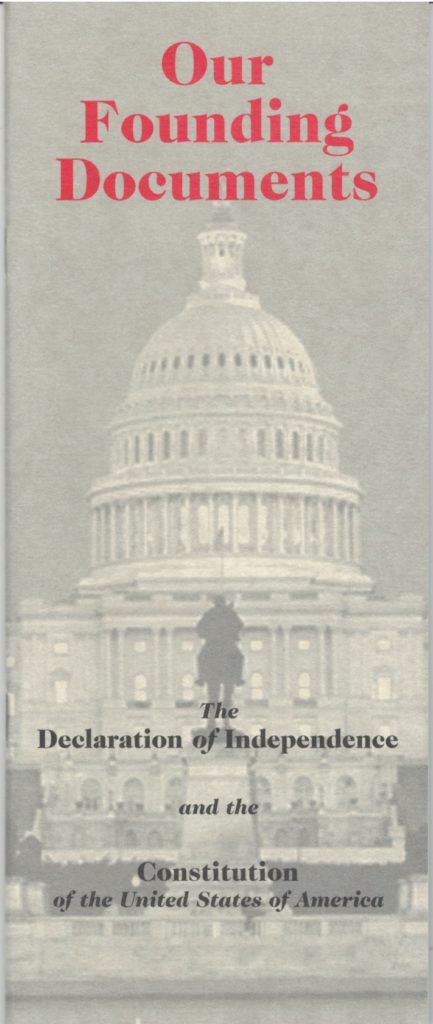
Our Founding Documents – Cover
I had written this column and thought it was appropriate to include in the package.
Jody searched for and found an accurate version of the documents for us to use. Just before it went to print, Jody mentioned that the inside front cover was blank and that I might want to write an introduction. I wrote one in about five minutes and dashed off a signature for Jody to scan. Once Jody had all the elements, he designed a beautiful booklet.
I don’t have a date for the writing of the introduction. The article itself was written over two days: January 20 and 30 2000. The Virginia O’Hanlon sequence was added December 24, 2000.
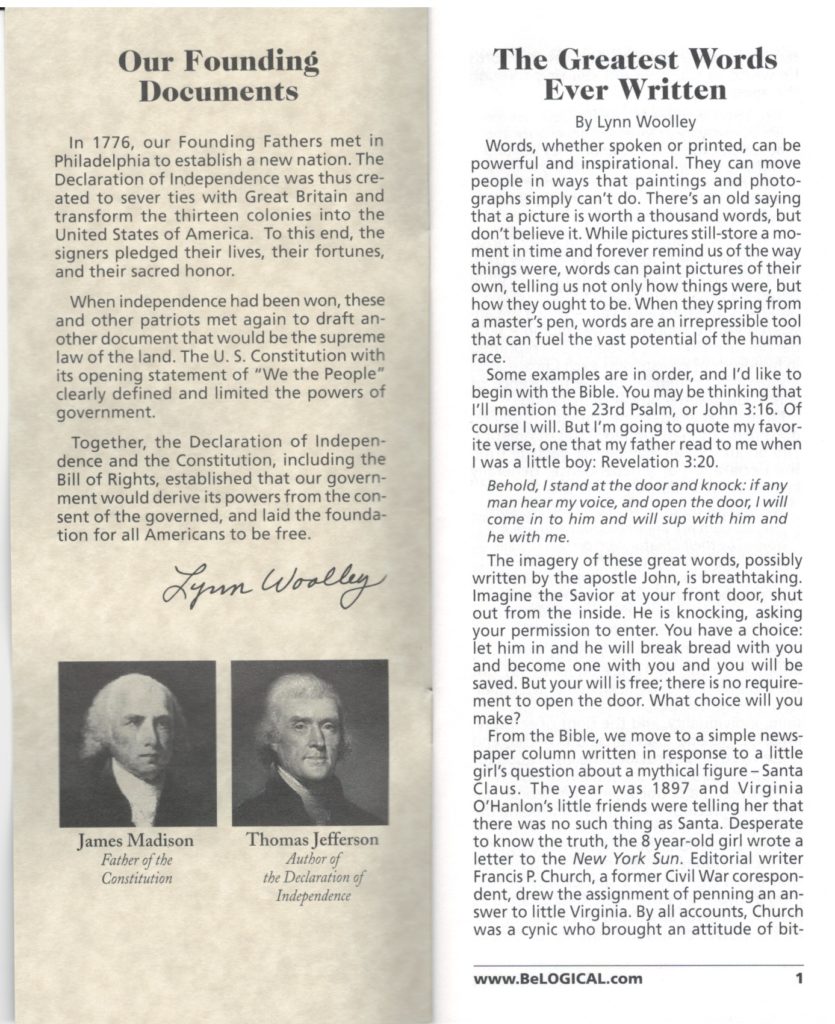
Introduction and Page 1
Introduction to the Greatest Words Ever Written
In 1776, our Founding Fathers met in Philadelphia to establish a new nation. The Declaration of Independence was thus created to sever ties with Great Britain and transform the thirteen colonies into the United States of America. To this end, the signers pledged their lives, their fortunes, and their sacred honor.
When independence had been won, these and other patriots met again to draft another document that would be the supreme law of the land. The U.S. Constitution with its opening statement of “We the People” clearly defined and limited the powers of government.
Together, the Declaration of Independence and the Constitution, including the Bill of Rights, established that our government would derive its powers from the consent of the governed, and laid the foundation for all Americans to be free.
The Greatest Words Ever Written
Words, whether spoken or printed, can be powerful and inspirational. They can move people in ways that paintings and photographs simply can’t do. There is an old saying that a picture is worth a thousand words, but don’t believe it. While pictures still-store a moment in time and forever remind us of the way things were, words can paint pictures of their own, telling us not only how things were, but how they ought to be. When they spring from a master’s pen, words are an irrepressible tool that can fuel the vast potential of the human race.
Some examples are in order, and I’d like to begin with the Bible. You may be thinking that I’ll mention the 23rd Psalm, or John 3:16. Of course I will. But I’m going to quote my favorite verse, one that my father read to me when I was a little boy: Revelation 3:20.
Behold, I stand at the door and knock: if any man hear my voice, and open the door, I will come in to him and will sup with him and he with me.
The imagery of these great words, possibly written by the apostle John, is breathtaking. Imagine the Savior at your front door, shut out from the inside. He is knocking, asking your permission to enter. You have a choice: let him in and he will break bread with you and become one with you and you will be saved. But your will is free; there is no requirement to open the door. What choice will you make?
From the Bible, we move to a simple newspaper column written in response to a little girl’s question about a mythical figure — Santa Claus. The year was 1897 and Virginia O’Hanlon’s little friends were telling her that there was no such thing as Santa. Desperate to know the truth, the 8 year-old girl wrote a letter to the New York Sun. Editorial writer Francis P. Church, a former Civil War correspondent, drew the assignment of penning an answer to little Virginia. By all accounts, Church was a cynic who brought an attitude of bitterness to work each day. And yet the words he wrote to the little girl still ring through the ages:
Yes, Virginia, there is a Santa Claus. He exists as certainly as love and generosity and devotion exist, and you know they abound and give your life its highest beauty and joy. Alas! how dreary would be the world if there were no Santa Claus. It would be as dreary as if there were no Virginias.
The Sun reprinted the column every Christmas until the paper folded in 1949 — only crediting Church after his death in 1906. Virginia became a teacher and is said to have received hundreds of letters each year — which she answered with a reprint of the column — until her death in 1971. The column is still reprinted in hundreds of newspapers each Christmas as a wonderful reminder of the innocence of childhood and the power of believing.
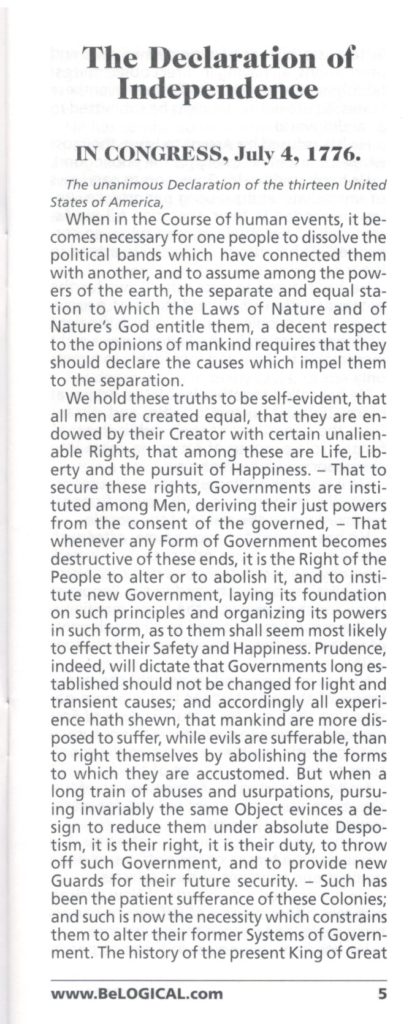
More great words come from the founding documents of these United States of America.
The greatest of all may be this passage from the Declaration of Independence, generally known as “A Declaration of Rights.”
We declare these truths to be self-evident: that all men are created equal and are endowed by their Creator with certain unalienable rights. That among these are life, liberty and the pursuit of happiness. That to secure these rights, Governments are instituted among Men, deriving their just powers from the consent of the governed.
The powerful words of Thomas Jefferson, adopted on July 4, 1776 eloquently lay out the basic tenants of civilized humanity: equality in the sight of God, the sanctity of life, freedom, individuality, and the right of self-governance. No one has ever said it better, and these words have provided the inspiration for millions of people in the pursuit of liberty.
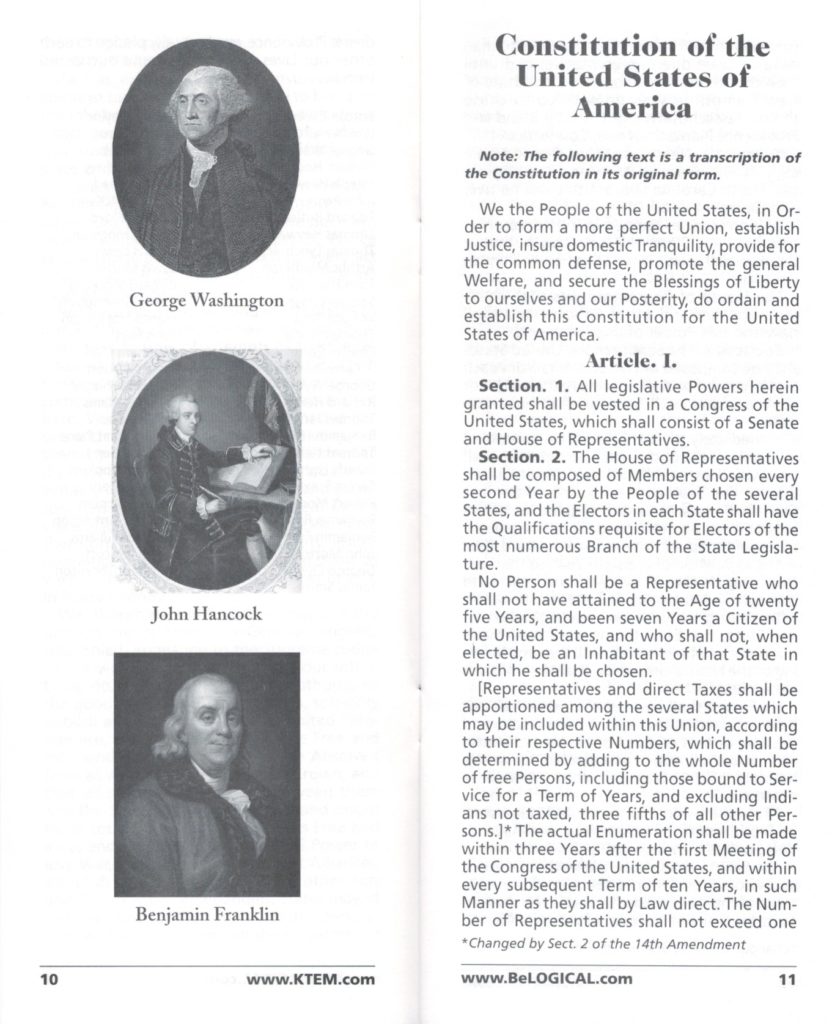
The other major document in American history is our precious Constitution (including the Bill of Rights) that sets forth the fundamental laws of our nation. Too often ignored by politicians and judges, it nevertheless is a beacon that lights the way to a special way of running a sovereign state — one that establishes specific rights for all citizens and implicitly limits the power of government. In its famous preamble, the Constitution begins with the three most important words in American history:
We the people of the United States, in order to form a more perfect Union, establish justice, insure domestic tranquility, provide for the common defense, promote the general welfare, and secure the blessings of liberty to ourselves and our posterity, do ordain and establish this Constitution for the United States of America.
Amazing! How precise and on-target, and how absolutely necessary for a struggling new nation. Alexander Hamilton organized the convention to be held in Philadelphia, originally to rewrite the Articles of Confederation. But delegates decided that a new document was needed. 39 of the 55 delegates signed the Constitution on September 17, 1787 including George Washington, Benjamin Franklin, James Madison, Jr., Alexander Hamilton, and Gouverneur Morris, who did much of the writing. Madison is known as the “Father of the Constitution” because of his negotiations and extensive record of the debates.
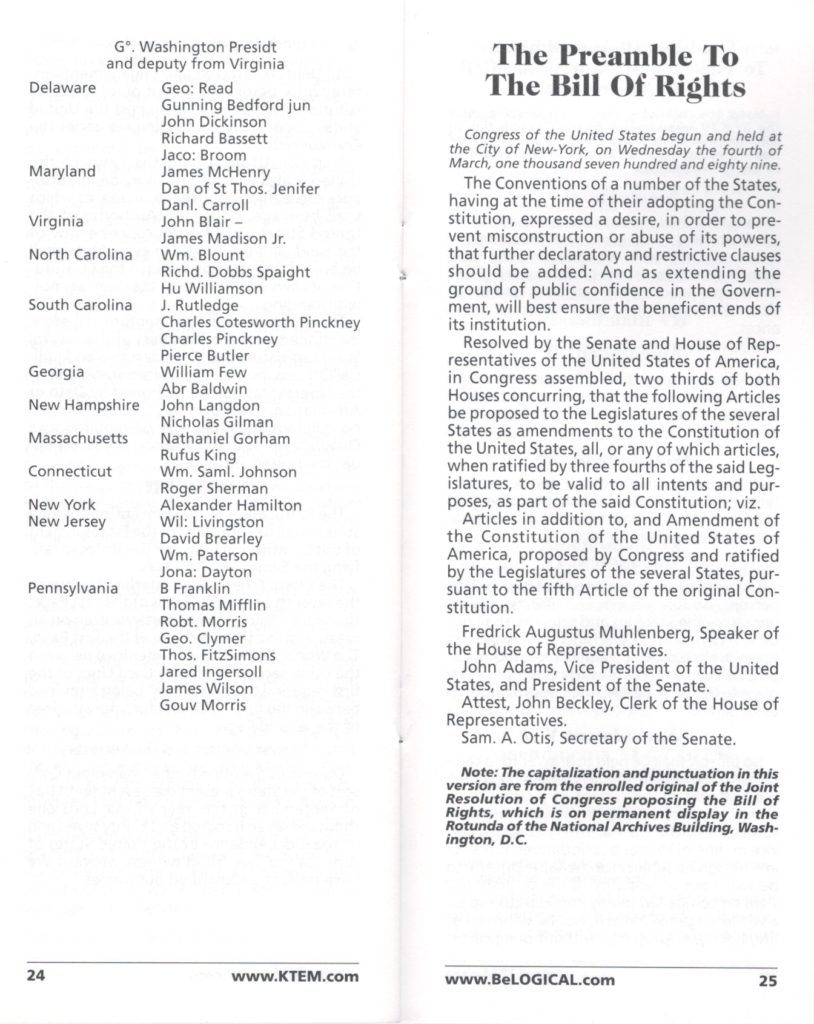
The signers (Left) The Bill of Rights (right)
The most famous speech in American history was delivered by President Abraham Lincoln on November 19, 1863 as he dedicated a Civil War cemetery to those who died in battle. Most people remember the opening line of the Gettysburg Address, but let me combine those words with the closing phrase of this extraordinary oratory:
Four score and seven years ago our fathers brought forth on this continent, a new nation, conceived in Liberty, and dedicated to the proposition that all men are created equal… …this nation, under God, shall have a new birth of freedom — and [we resolve] that government of the people, by the people, for the people, shall not perish from the earth.
In the Address, Lincoln made but one error — when he stated “The world will little note, nor long remember what we say here.” The world, of course, has remembered and the text of Lincoln’s words have been reprinted hundreds of thousands of times in the history books, the encyclopedias and patriotic writings. Edward Everett, who was the keynote speaker at the ceremony wrote to Lincoln: “I should be glad if I could flatter myself that I came as near to the central idea of the occasion in two hours as you did in two minutes.”
Finally, I want to include some words that come not from the Bible or from our great political documents and speeches, but rather from the poet’s pen. In 1893, Katherine Lee Bates wrote these words, later set to music by Samuel A. Ward:
O beautiful for spacious skies,
For amber waves of grain.
For purple mountain majesties
Above the fruited plain.
America! America!
God shed His grace on thee,
And crown thy good with brotherhood
From sea to shining sea.
This most inspirational verse, combined with three others that comprise the entire piece have become perhaps our most beloved patriotic song. In this first verse, Ms. Bates succeeds wildly in describing the vast beauty of our country and the pride that we should take in it. In the second and third verses, she trumpets the pilgrims and the sacrifices of American heroes in the cause of freedom. And in verse four, she looks to the future when “alabaster cities” will gleam without the shedding of human tears — all because of this great experiment known as American Democracy.
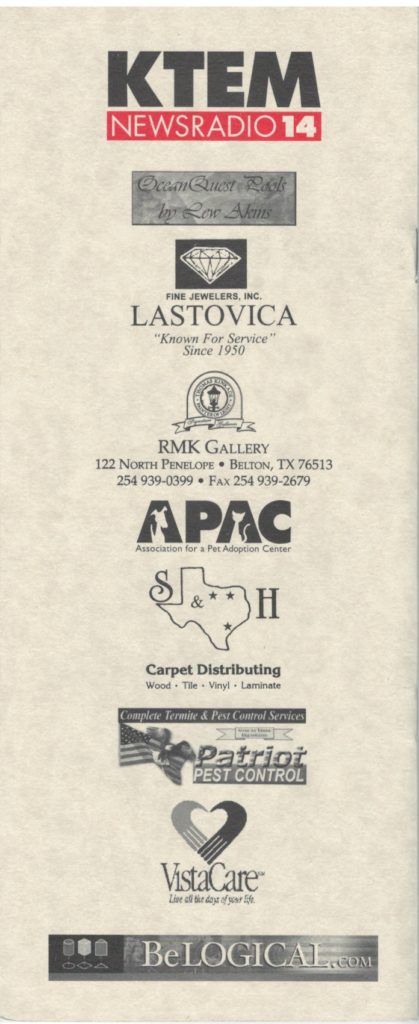
Back cover
Just words. But what amazing words they are. Words written with the power to inspire millions, and call them to action in support of great causes. These are the greatest words ever written. Long may they be cherished.
Lynn Woolley is a Texas-based author, broadcaster, and songwriter.
Follow his podcast at www.Planet Logic.us. Check out his author’s page at www.Amazon.com/author/lynnwoolley
Order books direct from Lynn at PlanetLogicPress.Square.Site
Email Lynn at lwoolley9189@gmail.com.

